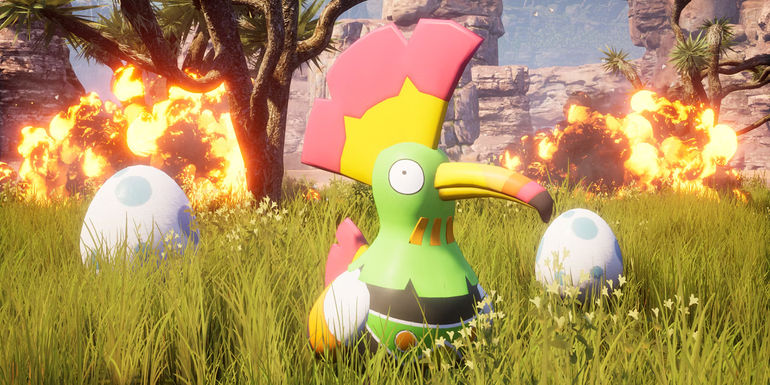
The Emergence of Palworld
In the world of gaming, every new release is bound to draw attention, and the case of Palworld is no exception. Developed by PocketPair, Palworld made its debut in mid-2021, introducing players to an open-world survival game with monster-taming mechanics. The early access version of the game became available on PC and Xbox consoles on January 19, and it didn't take long for it to stir up controversy.
Palworld Pal with explosions in the background
While some have drawn comparisons to Pokemon, others have criticized the game for its alleged similarities. The debate has intensified, with opinions ranging from enthusiastic praise to scathing criticism. Palworld's emergence has sparked a clash of creativity and criticism, leading to a heated discourse within the gaming community.
The game's concept, featuring monster-taming and survival elements, has garnered attention from both supporters and skeptics. Palworld's unique approach to gameplay has raised questions about its originality and its alleged resemblances to other well-known titles. However, amidst the controversy, the game has managed to carve out a niche for itself, attracting a substantial player base and igniting discussions about the boundaries of game design and inspiration.
Insights from Industry Veterans
The controversy surrounding Palworld recently gained momentum with the remarks of Don McGowan, the former chief legal officer of The Pokemon Company. McGowan's bold characterization of Palworld as 'ripoff nonsense' has sparked widespread debate and speculation. His comments, delivered in an interview with Game File's Stephen Totilo, have reverberated across the gaming industry, prompting discussions about the intersection of creativity and legal boundaries.
During his tenure at The Pokemon Company, McGowan encountered numerous instances of what he described as 'ripoff nonsense,' providing a unique perspective on the ongoing controversy. His insights have shed light on the challenges faced by developers and the complex dynamics of intellectual property in the gaming landscape. McGowan's views have sparked reflections on the delicate balance between creative inspiration and legal protections within the industry.
Furthermore, McGowan's remarks have raised questions about the potential implications for Palworld and its developers. The intersection of creativity and legal scrutiny has emerged as a focal point, prompting a deeper exploration of the boundaries of game design and the ethical considerations surrounding creative expression in the digital realm.
Navigating the Controversy
As the debate surrounding Palworld intensifies, the gaming community finds itself navigating a complex landscape of creativity, criticism, and legal considerations. The clash of perspectives has given rise to a multifaceted discourse, encompassing issues of originality, inspiration, and the ethical dimensions of game development.
The controversy has underscored the need for a nuanced approach to evaluating creative works within the gaming industry. It has prompted discussions about the intersection of artistic expression and legal protections, challenging stakeholders to consider the implications of their creative endeavors on a broader scale.
Amidst the ongoing controversy, Palworld's developers have been confronted with both acclaim and criticism, highlighting the intricate dynamics of public reception and the diverse interpretations of creative works. The clash of creativity and criticism has catalyzed a deeper examination of the boundaries that shape the gaming landscape, inviting reflection on the complexities of creative inspiration and the evolving nature of artistic innovation.














